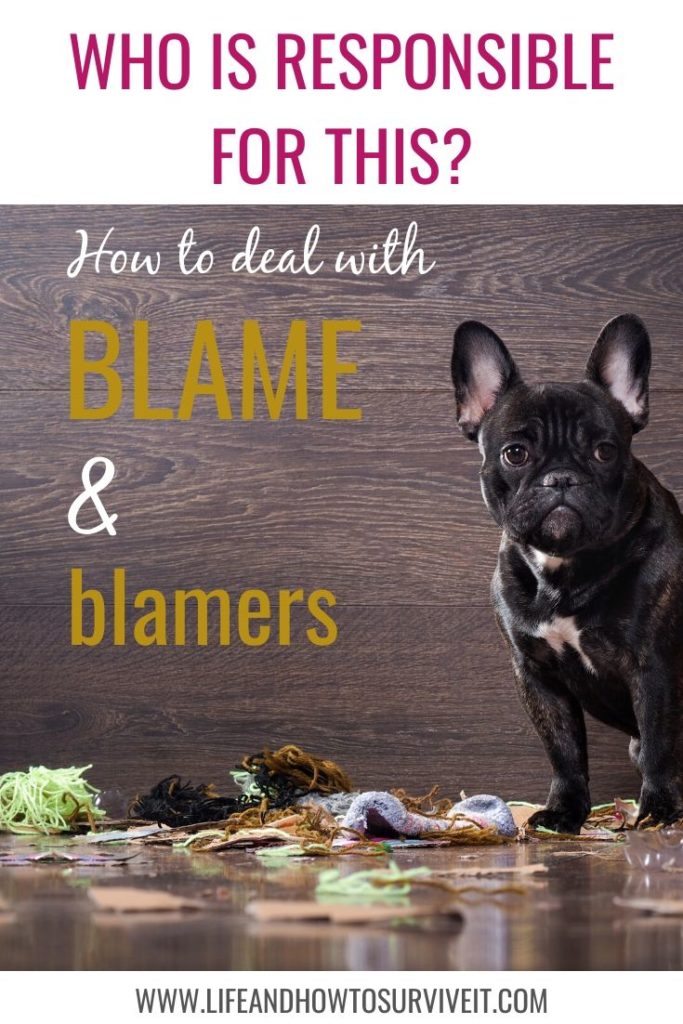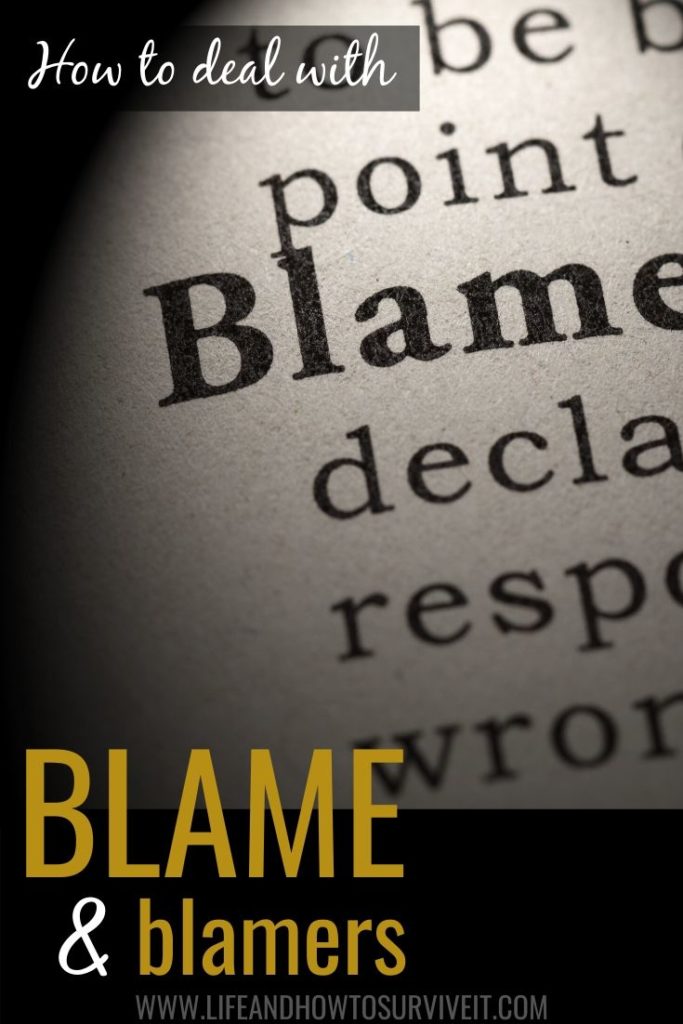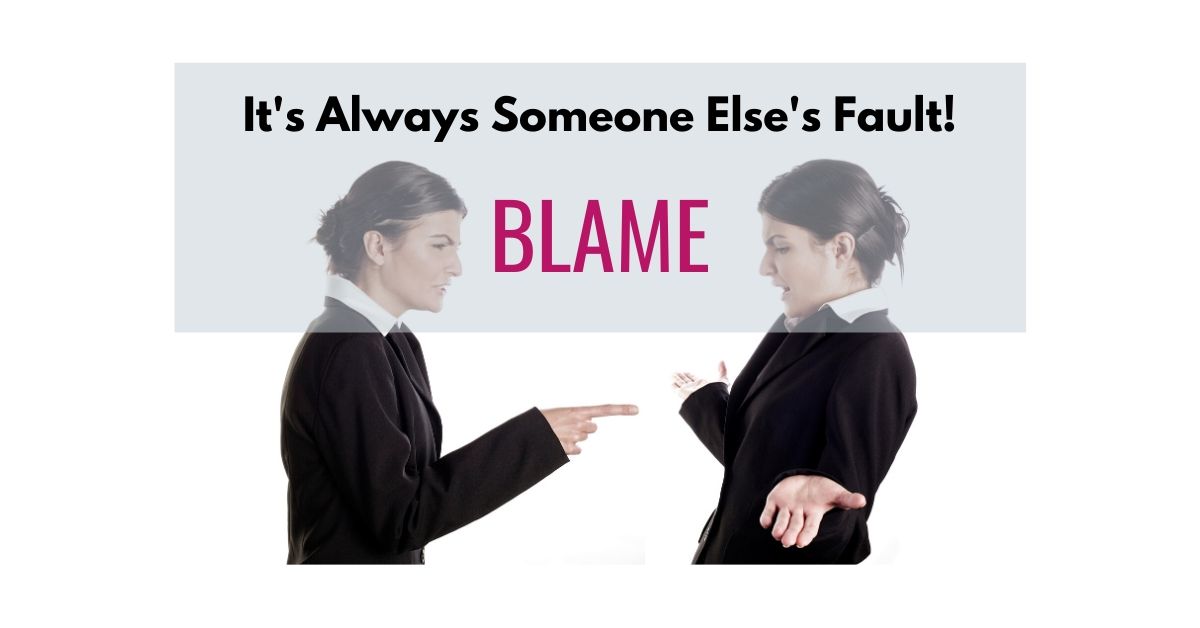It’s hard sometimes to admit that we’re wrong, that we messed up and made a mistake. This is especially true when our mistakes bring about unpleasant consequences. Have you noticed though, that some people find it almost impossible to admit their mistakes? They get by in life by looking to blame someone else when things go wrong. It’s always someone else’s fault!
So what is it that makes certain people incapable of admitting their mistakes? Maybe this is something you’re guilty of? Or do you have to live or work with someone like that? If so, what can we do to manage being with such a person?
It’s never my fault!
A past co-worker of mine, Brenda, used to say: “I don’t like being wrong, so I make sure that before I open my mouth, I know what I’m saying is correct.” Wow! How exhausting that must be! Having to consider every word before it pops out… even a seasoned politician, someone practised in watching what they say, would find this a challenge.
And it is of course impossible, unless you plan to take several minutes to carefully craft each reaction and measure every response.
We’ve all had to suffer someone like Brenda. Here’s a typical example of what it’s like working with her: Brenda was supposed to have some additional training materials printed out for a course. The day of the course arrives… but the additional materials do not.
This is a mistake that she can’t blame on someone else, since she is the only person in the team tasked with printing materials. You would think she has no way of saying that this is someone else’s fault: she would be forced to accept responsibility. You would be wrong!
There’s always an excuse
Brenda is very skilled in the art of excuse making. However, to accept criticism, kind or not, is not a skill she has learned. Brenda’s defensive response when questioned about the course materials was, “You don’t need to tell me how to do my job! I didn’t have time!”
She transfers the blame to some other ‘thing’ which can be identified as stopping her from doing her job. Very often, this level of defensiveness makes it extremely difficult to avoid repeating the same problem in the future. In trying to understand what went wrong, and learn from our mistakes, the blamer will put up many obstacles.
I didn’t have time!
Instead of prioritising the course materials, Brenda had spent the previous day looking at new office furniture online. Yes, new furniture was needed, but it was not in any way a priority. She simply found internet surfing easier and more interesting than doing the tasks that were much more important to the success of the company.
Not having time is a very convenient excuse for anyone who complains that it’s not their fault. But we all have the same amount of time. No one is given more time than anyone else in a day. How we spend it though is very different from one person to another.
In trying to explore with Brenda why she had spent her time looking for furniture instead of preparing the course materials, she became upset and hostile. She didn’t want to accept responsibility for the mistake.

Negativity
Many blamers, like Brenda, display narcissistic tendencies. Extremely sensitive to criticism, they typically become moody and angry when they are challenged or questioned. And to deflect blame, they often judge and criticise others.
By making others appear inferior, not only do they deflect blame: they also boost their fragile ego which makes them feel better about themselves. The blamer often secretly feels insecurity and vulnerability, and worries about feeling humiliated when things go wrong.
Perfectionism
Often, someone who claims “it’s not my fault” is also a perfectionist. Life coach Brooke Castillo has an interesting view of perfectionists. She says: ‘Perfectionism is for scared people, who are too terrified to take risks. They are unable to use failure as an opportunity to learn.’
Sadly, by cutting ourselves off from our failures, we make future success harder to come by. There is so much learning to be had from our failures, if we are prepared to take responsibility for them. This requires bravery and courage.
The blamer-perfectionist doesn’t like to try new things and step outside of their comfort zone. This would involve too much possibility of making mistakes. When learning new skills is unavoidable, any shortfall in the blamer’s performance can be attributed to poor teachers, or inadequate tools.
A bad workman always blames his tools
English Proverb
Blame as pain
Brene Brown describes blame as ‘simply the discharging of discomfort and pain. It has an inverse relationship with accountability.’ You attack another person verbally instead of being open and honest with yourself, or with the other person.
Pride
Sometimes it can be pride that stops us from admitting we’re wrong, or that we’ve made poor decisions. It can also deceive us into thinking we’re better than other people. When we see ourselves as superior, then logically, other people must be in the wrong rather than ourselves.
The challenge of someone who does not take responsibility
People who blame others don’t like taking responsibility when things go wrong. So what can you do if you’re unlucky enough to have this person as your boss, family member or friend? What strategies might you use to try to manage the situation?
Make your systems fool-proof
Let’s go back to Brenda. When she forgot to book a venue for an event, instead of taking responsibility for this, she put it back on to me: “But you identified that venue as a good facility.” This was true: I had suggested to Brenda that we use that venue. However, the responsibility for booking venues was Brenda’s job, not mine.
We need to to use such errors to our advantage. After the venue booking problem, we created a visual checklist for venue bookings, and displayed it on the office whiteboard.
Brenda had a tendency to not only blame mistakes on others, but also to forget to do things. This visual checklist was in effect a ‘Do my Job Properly” guide for Dummies, and it helped her do her job better. It was one less area that she could blame mistakes on others: the responsibility was clearly hers. We also updated the job descriptions to more clearly define accountability.

A blamer boss
A blamer boss probably points the finger at you for things not being done on time or properly. When s/he gives you a new task, cheerfully say “Great, Happy to do it. I’m currently working on X Y Z. How would you like me to prioritise this new work… ?
By explaining what your workload is and putting the decision about how to continue back onto your boss, it is harder for him or her to blame it on you if something isn’t completed on time.
This is a practical strategy, but to really manage the stress of being around someone who is never wrong, the person who has to change, is you. Yep, you read right. You can’t expect the blamer to change, but the one person that YOU can control is YOU.
Take back control
Having someone point the finger at us when it’s genuinely not our fault, puts us on the defensive. We might respond by lashing out, arguing, and complaining. However, none of these negative reactions are good for our health, and nor will they convince the blamer that they are wrong.
You can argue with a blamer til you’re blue in the face, provide video evidence of your innocence, and you still won’t get them to back down and say they’re sorry (of course not, the blamer rarely says sorry since they are never in the wrong…).
Train your reactions
So unless you plan to leave your job because you can’t bear the blaming boss, you need to train yourself to handle your reactions better. This is NOT about letting the blamer get away with it. It’s not your responsibility or anyone else’s to enlighten the blamer as to the error of their ways. It is your job though, to make your own life as meaningful and healthy as it can be.
When you feel yourself getting defensive, your first instinct is to respond. And so the “Yes you did – v – No I didn’t!” tug-of-war begins. Instead, try NOT to react at all. Just take a deep breath. Think about how you’re going to use your energy to do something that benefits you and not the blamer.
You’ve possibly not thought of it like this, but by reacting angrily to the blamer, you are simply fuelling their fire and wasting your own energy. What do you really gain by justifying yourself to the other person?
“But it’s not fair…”
Lots of things in life are not fair, many of them way beyond our control. Allowing a blamer to get you stressed and upset though, is nothing more than YOU not being fair to yourself. Whose side are you on? If you don’t have your own back, who will? So yes, when you first start training yourself to not react as you used to, it can feel a little like you’re taking it lying down.
Soon though you’ll begin to understand that you’ve been allowing the other person to control your feelings. Why would you want someone else to have the power over your emotions, to be able to stress you out and upset you?
Imagine that you’re allergic to milk. Along comes a blamer and passes you a cup of coffee. They tell you it has milk in it, and even though you know that it’ll be bad for you, you take it anyway. After you’ve drunk it, you complain that it had milk in it. Sounds ridiculous, put like that, right?
But that’s precisely what we do to ourselves when we pick up the blamer’s gauntlet. He or she throws down the glove and we just can’t resist it. We pick up that glove and the fight is on. We put ourselves in harm’s way. The other person simply opens up an invitation, we decide whether to accept or not.

How to handle someone who never takes the blame
Learning how to maintain your composure takes practise. Not allowing your sense of injustice at not ‘fighting back’ to come out requires patience and consistent checking. Perhaps you won’t achieve the desired calm and controlled response the first few times.
Eventually though, you’ll start to see how instead of spending the morning raging and complaining about something the blamer accused you of, you have succeeded in forgetting about it, moving on and focussing on something else that does in fact deserve your attention. Congratulations, you’ve taken your power back.
Conclusion
The blamer, in claiming that it’s always someone else’s, or something else’s, fault, always has an excuse. S/he isn’t interested in learning from their mistakes, and being better at what they do. By refusing to see their part in a problem – thereby avoiding the pain of being wrong – they render themselves incapable of improvement. They sabotage any possibility of personal development and self-awareness.
We can, however, change how we react in the presence of a blamer, to not fall into the trap of being the victim, and to not hand the blamer even more power and presence than they already have. So, which are you, the one doing the blaming, or the one suffering under a blamer? You don’t need to continue being either of these things!

